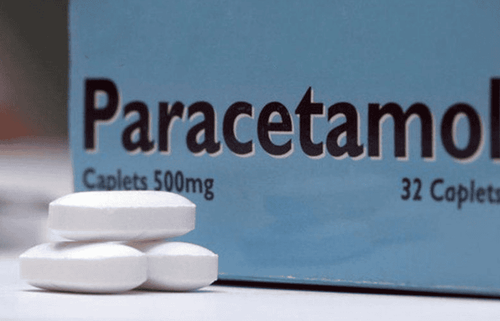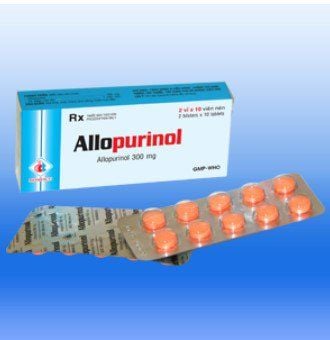This is an automatically translated article.
Article by Pharmacist Nguyen Thi Bich Phuong, Faculty of Pharmacy - Vinmec Ha Long International General Hospital.Aspirin (also known as acetylsalicylic acid) is classified as an analgesic, antipyretic, anti-inflammatory, antiplatelet drug, first introduced in the late 90s of the 19th century.
1. Mechanism of action and undesirable effects of aspirin
Aspirin is classified as a pain reliever, antipyretic, anti-inflammatory, antiplatelet agent.The action of aspirin and the corresponding mechanism of action varies with dose:
Low dose (75-100mg/day): Is sufficient to inhibit thromboxane A2 synthesis indirectly via thromboxane synthetase (thromboxane A2 also known as thromboxane A2 TXA2, which is a very potent vasoconstrictor, causes platelet aggregation). Thereby causing the effect of inhibiting platelet aggregation leading to anti-clotting. Moderate dose (650mg - 4g/day): Inhibits cyclooxygenase 1, 2 enzymes, prevents prostaglandin synthesis leading to inhibition of thermogenesis processes, enhanced heat loss and decreased sensitivity of sensory nerves to other substances. The pain agent of the inflammatory response causes an antipyretic and analgesic effect. High dose (4g-8g/day): The drug is as effective as anti-inflammatory drugs in the treatment of rheumatoid arthritis, the mechanism is through inhibition of the enzyme cyclooxygenase, preventing the synthesis of prostaglandins (chemical mediators of inflammation) caused by inflammation. That reduces inflammation. In addition, the drug also has an antagonistic effect on the proteolytic enzyme system, prevents protein transformation, stabilizes lysosome membranes, inhibits leukocyte chemotaxis, and inhibits leukocyte migration to inflammatory sites. However, at this high dose level, the drug is of little choice due to the limitations of toxicity: tinnitus, hearing loss and side effects of the drug on the gastrointestinal tract.
Mechanisms related to side effects of aspirin:
On the gastrointestinal tract: The stomach uses cyclooxygenase 1 (COX-1) to produce prostaglandins that protect the mucosa. Aspirin inhibits COX-1 leading to inhibition of prostaglandin synthesis that protects the gastric mucosa, thereby causing side effects such as dyspepsia, epigastric discomfort, heartburn, stomach pain, peptic ulcer, more severe can be cause gastrointestinal bleeding. Bleeding: Due to the antiplatelet effect, the drug increases the risk of bleeding and prolongs the bleeding time.

Thuốc Aspirin làm gia tăng nguy cơ chảy máu ở người bệnh
2. Some indications of aspirin: Pain relief, antipyretic, anti-inflammatory. Prevention of stroke, cerebral infarction, myocardial infarction. Patients with coronary stents. Patients with mechanical heart valve replacement (in combination with anticoagulants). Patient after coronary artery bypass graft. 3. What information do doctors need to know before prescribing aspirin? Before prescribing aspirin to a patient, the doctor needs to know some information, so you need to provide the following information to the doctor:
History of allergy to the drug or any of its ingredients, allergy symptoms you have experienced. Tell your doctor if you have the following conditions: Asthma, bleeding problems, nasal polyps, liver disease, kidney disease, gastrointestinal bleeding, peptic ulcer, blood diseases. Tell your doctor if you are taking anti-inflammatory, antiplatelet, anticoagulant, or any other medications. Inform your doctor if you are pregnant or breastfeeding. Care must be taken in children as the drug is not suitable for all children.

Người bệnh hen phế quản cần thông báo với bác sĩ trước khi được kê đơn
4. The unwanted effects of aspirin on the body
Side effects of aspirin are usually in the gastrointestinal tract related to the mechanism shared above such as: nausea, vomiting, dyspepsia, epigastric burning, belching, stomach pain, peptic ulcer, more severe can be gastrointestinal bleeding.
Although rare, in some people serious and even fatal side effects can occur such as:
Signs of an allergic reaction, anaphylaxis: rash, itching, redness, blistering, wheezing wheezing, chest pain, sore throat, difficulty breathing, difficulty swallowing, hoarseness, swelling of the face, nose, lips, mouth, and throat. Signs of bleeding: Vomiting or coughing up blood; vomit that looks like coffee grounds; bloody urine, black stools, bleeding gums; unusual vaginal bleeding; bruises that have no cause or get bigger, or bleed that can't be stopped. Signs of kidney problems: Not urinating, little urine, hematuria, or a lot of weight gain. Signs of liver problems: Dark urine, fatigue, yellow skin or eyes. Nervous, musculoskeletal: Muscle weakness. Tinnitus, hearing loss, fatigue, insomnia, restlessness, irritability. Hemolytic anemia, leukopenia, thrombocytopenia. Reye's syndrome: The disease causes acute brain damage and visceral fat degeneration (especially the liver).
5. What should patients pay attention to when taking aspirin?
The doctor will examine and diagnose the disease to give an appropriate dose level for the patient, absolutely comply with the prescribed dose, do not arbitrarily increase or decrease the dose, do not arbitrarily take longer than the prescribed time. .
Patients using drugs with the effect of preventing blood clots, anti-embolism do not stop taking the drug without discussing it with the doctor, even if they feel healthy.
The time to take the medicine according to the instructions of the medical staff and the prescribing information, for the brand name Aspilet 80mg EC, the patient should take it after meals to minimize discomfort on the gastrointestinal tract, take the tablet whole with a large glass of water. (≥200ml), do not chew or crush the tablet.

Người bệnh cần được tư vấn và lưu ý trước khi sử dụng thuốc Aspirin
Need to be aware of the risk of bleeding of the drug with the signs mentioned in section 3. Immediately notify the doctor when there are signs of bleeding.
Some commonly used antipyretic, analgesic and anti-inflammatory drugs (nonsteroid anti-inflammatory analgesics (NSAIDs), for example: ibuprofen (brand name Gofen 400mg, Alaxan), diclofenac (brand name Voltaren with different strengths). ..)) may affect the effectiveness of the medicine, increasing the risk of side effects (bleeding). Do not self-medicate with these medications unless directed by your doctor. In case of fever, or when pain medication is needed, paracetamol can be used alone (eg, Efferalgan, Panadol).
Drugs with a risk of bleeding. Therefore, every time you go to a doctor, perform surgery, perform a procedure, buy medicine, it is always necessary to inform medical staff (doctors, dentists, pharmacists, pharmacies, etc.) aspirin for advice on drug selection - safe treatment, reducing the risk of complications when taking the drug.
Alcoholism is associated with a risk of bleeding, so patients who drink more than 3 drinks a day should inform their doctor before taking the drug.
The drug can cause premature closure of the ductus arteriosus, delaying labor, so avoid use during pregnancy (especially the last 3 months of pregnancy). The drug is excreted in breast milk, high doses may cause rash, platelet malformations and bleeding in nursing infants, therefore, should be avoided in nursing women.
Note: Special case: Using low-dose aspirin with antiplatelet effect, in patients with antiphospholipid syndrome (ALP) or prevention of pre-eclampsia, the doctor may consider using the drug above pregnant and lactating women.
6. Why be careful when giving aspirin to children?
Adverse events related to aspirin use in children that have been reported include: Hepatitis with elevated transaminases, transient hearing loss, drug-related hemolytic anemia, Reye's syndrome.
Sử dụng thuốc aspirin ở trẻ em cần theo đúng chỉ định của bác sĩ
Reye's syndrome is a liver-brain disease that mainly occurs in children after recovering from acute viral infections such as the flu and chickenpox, this rare but very dangerous syndrome can lead to coma. coma and death.
Aspirin is associated with an increased incidence of Reye's syndrome when used in children with viral fevers (influenza, chickenpox). Cases of Reye's syndrome with varicella or influenza infection have been reported in children receiving high-dose aspirin therapy for Kawasaki disease.
Therefore, avoid pediatric aspirin and be especially cautious in children with viral fever.
To register for examination and treatment at Vinmec International General Hospital, you can contact the nationwide Vinmec Health System Hotline, or register online HERE.
References:
Aspirin: Drug information, Patient information, Update accessed April 18, 20 Aspirin: Mechanism of action, major toxicities, and use in rheumatic diseases, Update accessed April 18, 20 NSAIDs (including aspirin Pathogenesis of gastroduodenal toxicity, Uptodate accessed April 18, 20 Kawasaki disease: Initial treatment and prognosis, Update accessed April 18, 20 Product fact sheet Aspilets 80mg













